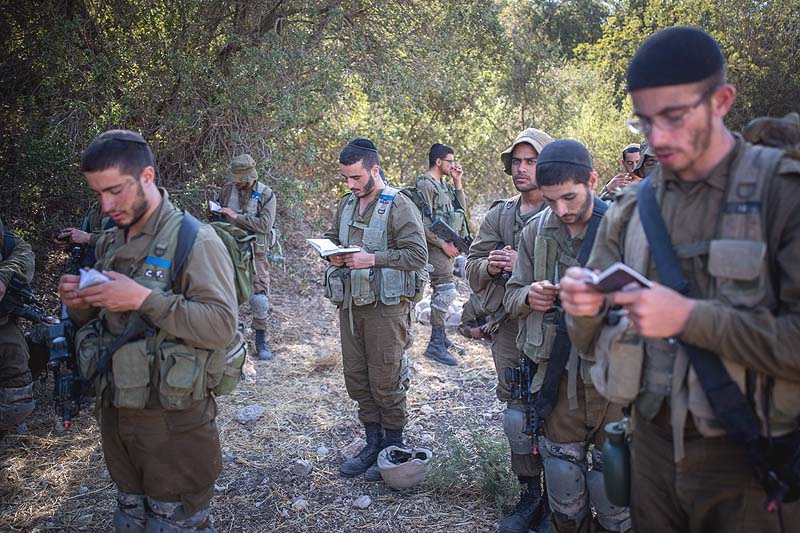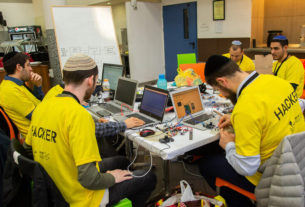The number of Haredi IDF recruits in 2018 was about 20% lower than in 2017, according to internal IDF data obtained by Haaretz and published on Sunday. According to those figures, last year 2,480 Haredim enlisted in the army, compared with 3,070 in 2017.
According to the data, 2018 was the first year in which the number of enlisted Haredim has gone down since the army had established Haredi-dedicated recruiting programs in 2007.
‘);
_avp.push({ tagid: article_top_ad_tagid, alias: ‘/’, type: ‘banner’, zid: ThisAdID, pid: 16, onscroll: 0 });
The number of recruits last year is short by about 800 from the last recruitment target of 3,200 set by the government for the IDF in 2016.
The decline was recorded at a time when the natural growth of the Haredi population has been 4% per year on average.
Under the current draft law, which is in place by a temporary extension granted by the High Court to allow the government to enact a new draft law, a Haredi recruit is defined as such if he studied at a Haredi institution for at least two years between the ages of 14 and 18. However, according to knowledgeable sources cited by Haaretz, about 90% of recruits who fit this definition and are not serving in the designated Haredi recruitment programs are no longer Haredi. They are merely young men whose parents had sent them to Haredi schools and have since left Haredi society.
According to the Security Service Law, which regulates IDF recruitment, the Defense Ministry was expected to publish the above recruitment data a few months ago, but the IDF HR division has kept the data confidential and refused to disclose them.
According to the IDF, “the figure regarding the number of Haredi recruits in 2018 (which began in July 2018 and ended in June 2019) has not yet been calculated.” But according to the knowledgeable source, HR already has the full data but decided not to publish, for fear of their being used politically, seeing as the very source of the collapse of the last Netanyahu government a year ago had to do with the split inside his coalition over the draft law.
Over the past five years, the military has failed to meet its Haredi recruitment targets set by the government, and the gap between them and the actual number of recruits is only increasing, according to Haaretz. In 2016, 2,800 Haredim enlisted, while the target was 3,200. In 2015, 2,475 Haredim were recruited, with the target being 2,700. And in 2014, 2,203 Haredim were drafted, with the target being 2,300.
The Tal Law, enacted in 2002 following the recommendation of the Tal Commission, headed by retired Judge Zvi Tal, attempted to manage the IDF Haredi draft by replacing the old status quo arrangement known as Torato Umnuto (Torah study is his job), according to which a person who exclusively studies Torah and is not engaged in any other means of earning his livelihood may postpone his military service every six months, until he reaches the age of exemption from the draft.
The problem was that when this arrangement was first granted, back in 1948, only about 400 yeshiva students were included, out of a population of 600,000 – about 0.07%. Even as late as 1977, only 800 Haredi students were included in this deal. But by 2005, a whopping 40,000 young Haredim were already included.
According to Tal Law, at age 22, a yeshiva student is granted a year during which he must decide whether to continue his studies or leave yeshiva to join the employment market. Should he choose to work, he must enlist for an abbreviated military service, or spend one year doing national service.
Over the ten years during which the Tal Law was being implemented, the vast majority of Haredi men preferred to continue their studies, so that the law did not prove to change the recruitment figures under the Torato Umnuto system. Therefore, on February 21, 2012, the High Court of Justice ruled that the Tal Law was unconstitutional.

It was the farewell gift of retiring Court President Dorit Beinisch, who was among the 6 judge majority (in addition to Miriam Naor, Elyakim Rubinstein, Esther Hayut, Hanan Meltzer and Neil Handel) who ruled that the Tal Law violated the human dignity of IDF recruits, despite the fact that it matches the inherent values of the State of Israel and had been enacted for a proper purpose.
However, the court majority ruled, it could be determined-after ten years-that the law did not meet the initial test of proportionality, the “rational relationship test” between the means chosen and their purpose. The ruling stressed that the number of yeshiva students enlisting in the army was too low and that the “decision year” mechanism had failed.
The judges found two salient features of the Tal Law which impeded the fulfillment of its objectives: first, the automatic four-year absolution given the Haredim from ages 18 to 22, which is then followed by the “year of decision,” delaying their enlistment by a minimum of 5 years; and second, the fact that Haredi yeshiva students are given full freedom of choice among the various program outlines, a privilege no other Israeli young man or woman are given.
So the judges ruled that the Tal Law was unconstitutional and should not be extended beyond its expiration date of August 1, 2012.
According to official IDF figures, by the time the Tal Law was killed by the high court, only 1,300 Haredim were enlisting each year. Without the law, even with declining figures, more than double the number of Haredim are drafted. The problem is that those are not real Haredim for the most part, and the number of actual Haredi yeshiva students who answer the call to defend their country has remained about the same: a little more than 1,000 each year.
‘);
_avp.push({ tagid: article_top_ad_tagid, alias: ‘/’, type: ‘banner’, zid: ThisAdID, pid: 16, onscroll: 10 });




